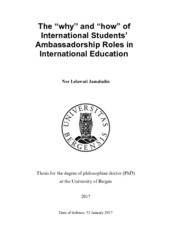| dc.contributor.author | Jamaludin, Nor Lelawati | |
| dc.date.accessioned | 2019-08-07T07:38:25Z | |
| dc.date.available | 2019-08-07T07:38:25Z | |
| dc.date.issued | 2017-01-31 | |
| dc.identifier.isbn | 978-82-308-3116-8 | |
| dc.identifier.uri | https://hdl.handle.net/1956/20655 | |
| dc.description.abstract | Current developments in tourism studies have sought to link international education experience to other domains of people’s lives. Although the literature on tourist experience as well as various perspectives pertaining to acculturation experience towards intention are quite large, this thesis maintains that some of these perspectives on how acculturation experiences are related to intentions are still too ambiguous. Therefore, this thesis presents a threefold idea of the phenomenon of the educational tourist acculturation experience. Reviews suggest that there has been little attempt to link social-psychological research on international students to wider tourism research. Based on reviews of tourism and general psychological literature, this thesis argues that international students’ destination-loyalty intention are influenced by motivation, cultural orientation, adaptation, individuals’ personal values and experiences arising during acculturation. It is contended that this forms the basis of preferences to revisit and to recommend a destination to others. The following is the primary objective of this thesis; namely, how do international students’ destination motivation, cultural orientation, adaptation, personal values, subjective well-being and acculturation experiences influence destination-loyalty intention? This was done to gain a better understanding of international students’ destination loyalty intentions. In line with this objective, the thesis had three aims: The first was to see how international students’ destination motivation (pull and push), cultural orientation and adaptation influence destination-loyalty intention. The second was to understand how the basic personal values influence international students’ subjective well-being and subsequently destination-loyalty intention. The third aim was to investigate the relationship between the experiences arising during acculturation (i.e., perceived discrimination and orientation to mainstream culture) and life satisfaction on the one hand and destination-loyalty intention on the other. The thesis is made up of three studies, and data for all studies were collected using an online survey among international students at the University of Bergen. Analyses of the data involved the use of hierarchical multiple regression analyses and structural equation modelling with the use of AMOS - Analysis of Moment Structures. The sample consisted of 378 short-term (N=183) and long-term (N=195) international students who accepted the invitation and filled out an on-line survey questionnaire in the first study. In a series of hierarchical multiple regression analyses, it was found that for short-term students, destination motivation (pull) together with orientation to mainstream, orientation to heritage and psychological adaptations were the most important variables influencing the decision to revisit and recommend the destination, accounting for 24.8% of the variance in destination-loyalty intention. For long-term students, destination motivation (pull) together with orientation to mainstream, orientation to heritage and sociocultural adaptations were the most important variables, accounting for 25.1% of the variance in destination-loyalty intention. In the second study, data was obtained from 396 (short-term, N=182) and (long-term, N=214) international students. AMOS results indicated that universalism was positively related to subjective well-being among short-term students and subjective well-being was positively related to destination-loyalty intention for both groups of students. Lastly, in the third study, AMOS results among a sample of 489 international students indicated that orientation to mainstream culture is positively related to destination-loyalty intention and it mediated the relationship between perceived discrimination and destination-loyalty intention. Although subject to some limitations, the overall results suggested that to ensure international students’ destination-loyalty intentions, the suggested variables are important. Based on the reported findings, this study concludes with practical suggestions for future study abroad coordinators, stakeholders and directions for future research. | en_US |
| dc.language.iso | eng | eng |
| dc.publisher | The University of Bergen | eng |
| dc.relation.haspart | Paper I: Jamaludin, N. L., Sam, D. L., Sandal, G. M., & Adam, A. A. (2018). Destination motivation, Cultural orientation and Adaptation: International Students’ Ambassadorial Roles. Journal of International Students, 8(1), 38-65. The article is available at: <a href="http://hdl.handle.net/1956/20653" target="blank">http://hdl.handle.net/1956/20653</a> | eng |
| dc.relation.haspart | Paper II: Jamaludin, N. L., Sam, D. L., Sandal, G. M., & Adam, A. A. (2016). Personal values, subjective well-being and destination-loyalty intention of international students. Springerplus, 5(1), 720. The article is available at: <a href="http://hdl.handle.net/1956/20654" target="blank"> http://hdl.handle.net/1956/20654</a> | eng |
| dc.relation.haspart | Paper III: Jamaludin, N. L., Sam, D. L., Sandal, G. M., & Adam, A. A. (2018). The influence of perceived discrimination, orientation to mainstream culture and life satisfaction on destination-loyalty intentions: the case of international students. Current Issues in Tourism, 21(8), 934-949. The article is not available in BORA due to publisher restrictions. The published version is available at: <a href="https://doi.org/10.1080/13683500.2015.1119102" target="blank">https://doi.org/10.1080/13683500.2015.1119102</a> | eng |
| dc.rights | Attribution CC BY | eng |
| dc.rights.uri | http://creativecommons.org/licenses/by/4.0/ | eng |
| dc.title | The “why” and “how” of International Students’ Ambassadorship Roles in International Education | eng |
| dc.type | Doctoral thesis | |
| dc.rights.holder | Copyright the author | eng |
| dc.identifier.cristin | 1437276 | |

